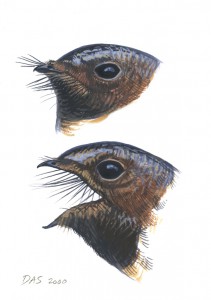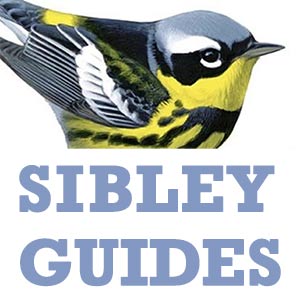The painting shown here was recently sold at auction

Birds in the family Caprimulgidae, which includes Eastern Whip-poor-will (shown here), have been referred to as “goatsuckers” based on a superstition that goes back well over 2000 years. They all have tiny beaks that open to reveal an impressively large mouth used to catch flying insects, and they are active mainly at night. Their nocturnal habits made them mysterious, and their bizarre appearance required an explanation, and as early as the 300s BC Aristotle wrote about the trouble these birds could cause with goats. Four hundred years later not much had changed, and in 77 AD Pliny passed along the prevailing wisdom:
The Caprimulgi (so called of milking goats) are like the bigger kind of Owsels [Thrush]. They bee night-theeves; for all the day long they see not. Their manner is to come into the sheepeheards coats and goat-pens, and to the goats udders presently they goe, and suck the milke at their teats. And looke what udder is so milked, it giveth no more milke, but misliketh and falleth away afterwards, and the goats become blind withall. (from the 1601 translation)
Ernie Choate’s entertaining 1973 book – The Dictionary of American Bird Names – includes another quote from Pliny:
When I was in Switzerland I saw an aged man, who fed his goats upon the mountain, which I had gone up in search for plants: I asked him whether he knew of a bird the size of a Merula [Eurasian Blackbird], blind in the day-time, keen of sight at night, which in the dark is wont to suck goats udders, so that afterwards the animals go blind. Now he replied… that he had suffered many losses from those very birds; so that he had once had six she-goats blinded…. But possibly that aged man was jesting with me.
It’s not clear how many people ever believed this. It sounds like Pliny may have had some doubts, and the superstition faded away centuries ago. We still use the name but the “goatsuckers” eat nothing but flying insects and have no interest in, or effect on, goats.


Interesting read
The original Chupacabra
Very unlikely that Pliny would have spoken of Switzerland. It wasn’t called that for at least a thousand years later.
It was a translation, he didn’t actually say Switzerland but rather called it by whatever it was known as at the time
Hello, this is not a quotation from Pline (mistake in Choate dictionary). It’s a commentary on Pline’s Historia made in 1544 by William Turner, who travelled then in Switzerland, in his own De Historia Avium. Written in Latin also, he used the Latin name for Switzerland: Helvetia. (X.N Borloz, Black Roses cultural association)
Pingback: Oilbird : Humboldt’s Chupacabra – The Wild Episode
They do have interest in goats and other livestock, fyi. Livestock attract pests. Goatsuckers eat the pests. They are helping the livestock not hurting them. If the bugs are around their face that’s not the birds fault.
Also Mr Sibley, long time no see. We did bird together a few times when I was a young child. At Hawk Mountain. Remember that place? Old days. Probably 40 years ago. You knew my dad.